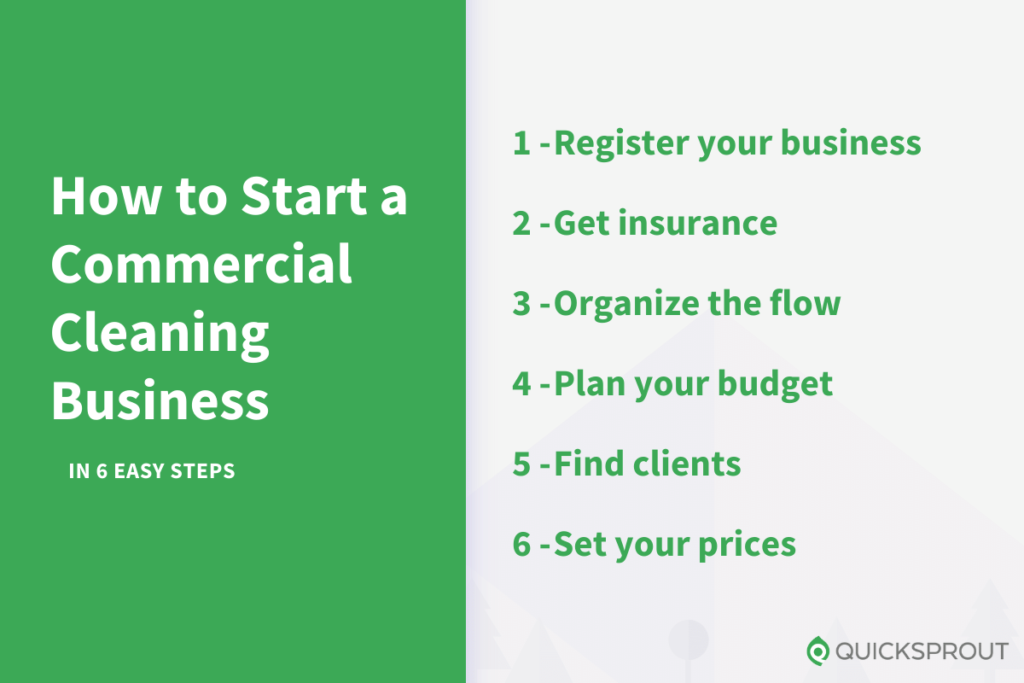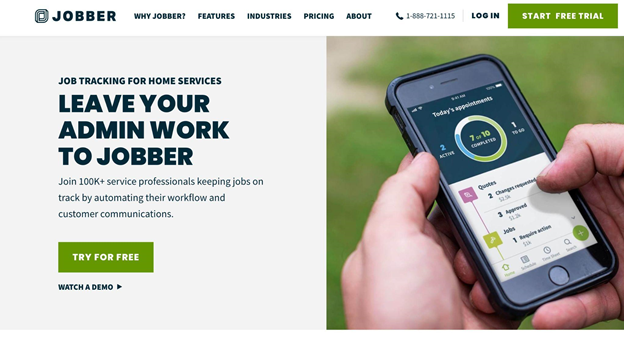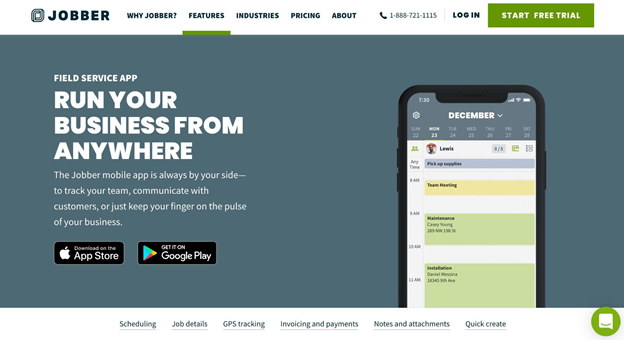Are you looking to start a new business that has minimal overhead?
There may be several businesses that come to mind when you think about that, but today we are here to present you with an option that you may or may not have considered before: a commercial cleaning business.
This is one type of business that has much lower up-front costs than others and also is one that you can start quickly and fairly easily without the need for a bunch of capital.
It is also one that doesn’t require a bunch of experience or previous knowledge. Even if you don’t yet have connections, that doesn’t mean you can’t find success in this industry.
However, commercial cleaning is also a type of business that requires working hard and understanding that profit growth will likely happen slowly.
If this sounds like something you may be up for, continue reading to find out how you can start a commercial cleaning business today.
6 Steps to Start a Commercial Cleaning Business
This is the blueprint to start a successful commercial cleaning company:
- Register your business
- Get insurance
- Organize the flow
- Plan your budget
- Find clients
- Set your prices

The Easy Parts of Starting a Commerical Cleaning Business
Let’s start with the easy stuff so that you can get the ball rolling on your idea.
Register your business
Though not necessarily the fun parts of a commercial cleaning business, there are some things that you can get out of the way that help you take steps in the right direction.
One of those things is registering your business with the state. You have a few different options when it comes to choosing the type of business you want to register as.
- Sole proprietorship. This type of business is best for those who are starting the business on their own and want to have as much control as possible. However, note that a sole proprietorship does not separate your business assets from your personal assets. So, in the case that something goes wrong with your company, your personal assets are at risk.
- Limited liability company (LLC). This is the most common type of business that people choose for commercial cleaning companies, and it’s primarily because, unlike a sole proprietorship, it separates personal assets from business assets. With this type of business, however, you are self-employed so you still have to pay self-employment taxes such as Medicare and Social Security.
- Partnership. This is the type of registration you want to choose if you are getting into your commercial cleaning business with another person. You can either opt for a limited partnership or a limited liability partnership.
- Corporation. If you are looking for maximum protection, this is the type of business to register as. The only downside is that corporations are the most expensive to create. You must pay income tax on your profits, and you are taxed separately.
Implement cleaning business software
It may feel overwhelming at first to keep everything organized with your commercial cleaning business, and that feeling may grow as your business expands and as you hire more employees and gain more clients.
To help you keep things organized no matter what stage of your business you’re in, we suggest investing in software that can help make things easier, specifically work order software.
One such tool to start using is Jobber.

This software works best for field service, like what you’ll be doing with your commercial cleaning business. It helps you and your team organize and schedule cleanings as well as invoice clients easily so that everything runs smoothly in your business.
Jobber offers all sorts of tools that we will go into more detail about down below, but you can access them all from a user-friendly dashboard that optimizes efficiency.
Prices for Jobber start at $69 per month.
The Difficult Parts of Starting a Commercial Cleaning Business
To find success in a commercial cleaning business, you’ve got to get your hands dirty, both literally and figuratively. That means pushing through the hard parts of starting this kind of company.
To help you in this, we are sharing one of the things you should know will present a challenge when starting your commercial cleaning business.
Market research
Before you dive too deep into building your business, you need to make sure that there is a market for your business.
How many companies in your area need commercial cleaning? Why should they hire you as opposed to someone else?
Here are some of the best ways you can start market research.
- Create an online survey that you send to businesses in your area that may need cleaning services. You can send them via email or LinkedIn.
- Pick up your phone and call business owners in your area. Offer to take them to coffee to chat about how you can help them.
- Hop on review sites such as Yelp and Google to see what businesses may need cleaning services.
- Consider offering free cleaning products to potential customers to try out for themselves.
When doing all of the above, you also want to think about competitors in the area. What are they missing from the services that you can offer?
In addition to that, know your limits when doing your market research. In the beginning, you are likely starting small so be realistic about what projects you can take on. Try to research markets where massive multiple-story office buildings are looking for professional cleaners is not something you may be able to tackle from the get-go.
Step 1: Register Your Business
The first step you want to take in your commercial cleaning business is to make it official. That requires registering your business in the state that you’ll be performing your work.
As mentioned above, there are a few options to choose from when deciding what type of business entity to start. It may be a good idea for you to talk to a lawyer about the pros and cons of each and which one is the best option for you for now, and also for the future.
Step 2: Get Insurance
One of the most important things you need to do when starting your commercial cleaning business is to make sure you are protected.
You do this by purchasing commercial cleaning business insurance. This covers you if any sort of accident or injury occurs on the job. Without this, you run the risk of paying out a large sum of money in damage, which may cause your business to go under.
To avoid this from happening, get yourself insurance from the beginning. Below are the different types you may want to look into getting.
General Liability Insurance
This insurance protects your business from any third-party accidents as well as property damage, injuries on the job, and more.
Workers’ Compensation Insurance
If you are looking to hire employees to help you with your commercial cleaning business, then you need to get workers’ compensation insurance. This protects your employees if they get hurt on the job or sick.
Commercial Auto Insurance
If you plan to have company cars for your cleaning business (which is typical in this industry), you also need commercial auto insurance.
Step 3: Organize the Flow
It is important that from the start, you get a good flow going with your commercial cleaning business. Rather than being disorganized and using archaic systems to schedule cleanings for clients, invoice clients, and more, adopt a tool that will make all of these things easy for you and easy for your customers.
The best way to do this is by using work order software like Jobber.
This software is ideal for on-the-go field services like you’re providing in your commercial cleaning business.
One of the biggest bonuses of this tool is the mobile app.

You can do nearly everything from your phone with Jobber including:
- Track your team
- Communicate with customers
- Know where things are at with your business
- Schedule cleanings
- See job details
- Invoice
Between the app and the desktop version of Jobber, you gain access to all sorts of features that will make running your commercial cleaning business a smooth process. Some of the features you’ll love include:
- Automatic follow-ups with customers
- Real-time scheduling
- Real-time dispatching
- Batch invoicing
- Online booking for clients
- Custom checklists
- Branded professional quotes that can be sent via text message
- Email and postcard marketing
- Online payments
- Reporting
- “On my way” text messages
By bringing this software into your company, you will find that things go much more smoothly and your clients are much happier.
There are a few different package options for Jobber depending upon your specific needs.
- Core. $69 per month. 1 user. Provides the basics for organizing your business.
- Connect. $169 per month. Up to 5 users. Provides tools to help you connect your team and create strong customer relationships.
- Grow. $349 per month. Up to 15 users. Provides tools to help you scale your business and automate processes.
Step 4: Plan Your Budget
Though the overhead and startup costs of a commercial cleaning business are not nearly as large as other businesses, there are some expenses involved.
The two biggest expenses with your cleaning business are supplies and transportation. The amount you pour into these things depends on the size of your business. Chances are, you won’t need to allot a massive budget as you are just starting with very few (if any) employees besides yourself and minimal clients. However, as you grow, this will change.
Here is a breakdown of the things you need to consider with your budget.
Transportation
It is up to the cleaner to get to the client’s place of business, so if you plan to hire employees, it is your responsibility to get them to and from cleaning gigs. Thus, you need to plan a budget for transportation, whether that is providing them with company cars or giving them a gas stipend.
Supplies
To do your job well, you need the right cleaning supplies. Some clients may allow you to get your own cleaning supplies, which are best bought in bulk. Other clients may prefer that you use specific products that they provide. Determine which is best for you, and plan a budget accordingly.
Equipment
Part of the cleaning job may require you to have access to or purchase your own equipment or machines for things such as cleaning carpets, specialty flooring, upholstery, and more. Take the time to sit down and calculate whether you should rent this machinery and equipment, or whether it makes more sense for you to outright purchase the equipment to have on-hand whenever you need it.
Step 5: Find Clients
Your commercial cleaning business won’t be a success unless you find clients to clean for. This may be one of the more challenging parts of starting your business, thus you must focus your efforts on this once you’ve got all the other business details sorted out.
There are a few different ways that you can go about finding clients to keep your business going.
References
When reaching out cold to new clients, it is best to have on-hand references from past jobs that you can provide. Showing your previous work to potential clients is pretty hard when it comes to cleaning services, so you’ll need to rely on references from previous or current clients to show your work.
You can either provide those references via email or put them on your website for any potential client to see.
Referrals
Once you have a more established client base, referrals will be the best way to get new clients. This is one of the reasons why it is so important for you to establish strong relationships with current clients – not only so that they continue to be clients of yours, but also so they spread the word about your good work.
Step 6: Set Your Prices
To get clients and keep them coming back, your pricing needs to be competitive. To find competitive pricing, you need to take into account a few different things:
- Location
- Services
- How much competition there is
Once you’ve done your research on those things, you want to decide whether you want to charge your clients by the hour, by the square footage, or by using a flat rate.
Whatever you do, do not just pick random prices. Take the time to research the market and see what other commercial cleaning businesses are charging, and how your rates should compare.
